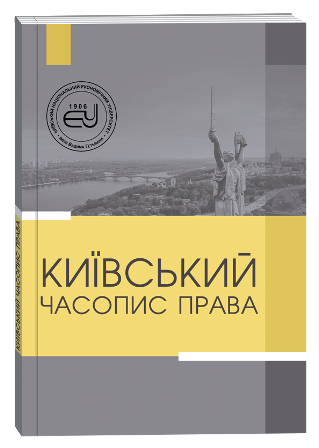USE OF ARTIFICIAL INTELLIGENCE IN BUSINESS ACTIVITY
DOI:
https://doi.org/10.32782/klj/2025.2.20Keywords:
commercial legal relations, artificial intelligence, digital economy, new technologies, digitalization, digital transformationAbstract
Modern trends highlight the rapid advancement of artificial intelligence technologies, which are increasingly integrated into diverse facets of human activity and are transforming business environments and technological processes across numerous industries. The adoption of innovative AI-driven solutions unlocks new opportunities for enterprises and organizations, enabling them to enhance existing workflows, boost productivity, and lower operational costs. This article delves into critical aspects of business digitalization, exploring its core essence, potential benefits and drawbacks, as well as the challenges associated with implementing and adapting such processes within domestic enterprises. The analysis underscores the notion that digitalization–spanning all sectors of the economy and business– plays a pivotal role in strengthening both internal and external organizational connections, ultimately driving higher productivity and enhancing overall business efficiency. The transformative capabilities of artificial intelligence in optimizing business processes are discussed, with a particular focus on Ukraine’s experience in integrating such technologies into business operations. The article examines academic interpretations of the term “artificial intelligence” and offers the author’s unique perspective on its definition. Furthermore, it identifies potential avenues for economic improvement through AI integration. Artificial intelligence holds immense potential to streamline processes within commercial law at multiple levels. By analyzing vast datasets, AI algorithms can uncover hidden patterns that may evade human detection, which is especially valuable in risk evaluation, forecasting economic trends, and devising strategic plans. While the prospects for employing artificial intelligence within commercial legal frameworks are substantial, they come with significant challenges. One key concern is the necessity to establish legal frameworks for regulating AI applications and addressing the status of artificial intelligence within the domain of commercial legal relations.
References
AI in the UK: ready, willing and able? URL: https://publications.parliament.uk/pa/ld201719/ldselect/ldai/100/100.pdf (дата звернення: 26.07.2025)
Левицька Н. Використання цифрових технологій у праві. Підприємництво, господарство і право. 2019. № 9. С. 165–169.
Заячковська Г. А. Маркетингові можливості підприємств на основі штучного інтелекту. Трансформаційна економіка. 2024. No2 (07). С. 17–22.
Мар’єнко М. В., Коваленко В. В. Штучний інтелект та відкрита наука в освіті. Фізико-математична освіта. 2023. No 38(1). С. 48–53.
Parliament resolution of 16 February 2017 with recommendations to the Commission on Civil Law Rules on Robotics (2015/2103(INL)). URL: https://eur-lex.europa.eu/legal-content/EN/TXT/PDF/?uri=CELEX:52017IP0051 (дата звернення: 26.07.2025)
Петренко А. Штучний інтелект і право / А. Петренко // Право та інновації. 2021. № 2. С. 45–52.
Каткова Т. Г. Штучний інтелект в Україні: правові аспекти / Т. Г. Каткова // Право і суспільство. 2020. № 6. С. 46–55.








